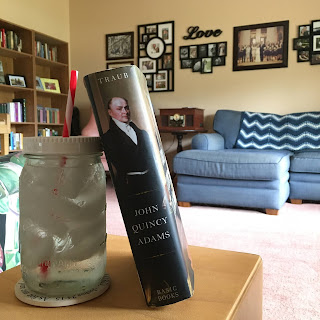Charlotte's Web is another of those stories with which I was very familiar, but (to my shame) had never actually read for myself. It's also the third children's novel I've read this year that made me genuinely sorry I hadn't read it sooner (the first two being A Little Princess by Frances Hodgson Burnett and Tuck Everlasting by Natalie Babbitt). I grew up with the 1973 animated film adaptation which I loved as a kid. I haven't seen it in years, and I totally forgot it was a musical until I looked it up for this post. I also saw the 2006 live action adaptation a few years ago and immediately bought it because it was so sweet. I finally snagged a copy of the actual book at The Book Shelter a couple years ago, and it sat neglected on my shelf until my niece came over one day with her copy and announced she would be reading it. Naturally, I had to join her.
Charlotte's Web by Elwyn Brooks White was first published in October of 1952. It's won a load of awards including the Newbery and is on pretty much every list of best loved novels you can imagine. It's a teacher favorite and in a 2012 survey of School Library Journal readers, it was voted #1 out of the "Top 100 Chapter Books" of all time. The librarian conducting the survey said it would be impossible for Charlotte's Web not to be #1. E.B. White himself won a special Pulitzer Prize in 1978 for his full body of work and the Presidential Medal of Freedom in 1963. However, he was terribly shy and hated publicity and was known to sneak out of his office via his fire escape to avoid visitors which is a fact I just absolutely love about him.
Charlotte's Web is the story of a little pig named Wilbur and his remarkable friend Charlotte A. Cavatica who happens to be a spider. After being born the runt of his litter, Wilbur is rescued by Fern Arable who pleads with her father not to kill the tiny piglet. After five weeks of pampering from Fern, he goes to live on the Zuckerman farm down the road where he befriends Charlotte (and a whole barnyard full of animals) who becomes so fond of him that she promises to save him from becoming the Christmas ham and proceeds to spin words describing Wilbur into her web creating a sensation and finally landing him at the County Fair.
I love this dear story. As Eudora Welty put it: "What the book is about is friendship on earth, affection and protection, adventure and miracle, life and death, trust and treachery, pleasure and pain, and the passing of time. As a piece of work it is just about perfect, and just about magical in the way it is done." I can't describe it any better than that. Its sweetness is only enhanced by the sketches of Garth Williams throughout its pages, and the 2006 adaptation featuring the voice of Julia Roberts as Charlotte is equally delightful. It's a can't miss, and I highly recommend you read it at least once in your life—sooner rather than later.
Have you read Charlotte's Web? What is your favorite book from childhood?













